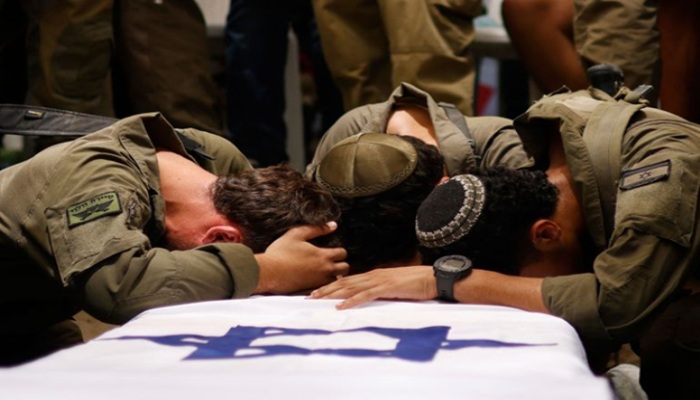
Afrasianet - The testimony of Israeli soldier Gadi after two years of fighting following the Al-Aqsa Flood attack reveals the deep psychological and social collapse that Israeli soldiers are experiencing, according to the Yedioth Ahronoth newspaper.
According to Gadi (a pseudonym), Israeli soldiers returned from the front as "half-human beings" who suffered from isolation, the disintegration of their families and a loss of meaning.
Gadi describes how reserve service in the IDF turned into a burden that destroyed the lives of thousands, in light of the state's disregard for their real suffering, reflecting an identity crisis within the IDF and Israeli society after the war, and the collapse of the image of the "heroic soldier" to be replaced by the image of the exhausted fighter and the victim of an endless war.
In a shocking testimony published by the Center for Available Culture in Tel Aviv, soldier "Gadi" recounts his experience fighting on the fronts of Gaza, Lebanon, and Syria, since the outbreak of the war on October 7, 2023, following the Al-Aqsa Flood operation carried out by the Palestinian resistance. His testimony reveals the deep psychological and social collapse that Israeli soldiers are experiencing after the war, the disintegration of their families and the dissipation of their image as "heroes" in the eyes of Israeli society.
"We returned as half-humans"
Ghadi describes his situation after returning from the front: "Everyone who came back from this war, even those who seem successful and stable, have returned half a human being. Nothing inside but debris."
The soldier talks about his life that collapsed from the inside despite his cohesive external appearance, and about his loss of the ability to communicate with his family, wife and children, after living for a year and a half on the battlefields.
"You can't send a father of young children to a long war and then suddenly bring him back to live as if nothing had happened," he says.
He adds that the word "well done" from his surroundings has angered him, because it reminds him that society sees only the "heroic appearance", while living in deep psychological devastation within him.
Ghadi recounts that his family used to live without him, so his presence at home became a burden. "When I came back, I felt like a strange guest," he says. The children don't know how to talk to me, and my wife is exhausted by the responsibility and constant fear."
He describes how repeated wars have become a constant nightmare for soldiers' families, with wives living under constant pressure between fear of receiving the news of their husbands' deaths and the inability to manage daily life on their own, while there is no real care or support from the Israeli state.
"A Curse... Not a Hero"
Gadi asserts that the idea of "equality of burdens" promoted by the Israeli government is a deception, describing it as "equality in the use of life," explaining that long reserve service has destroyed the lives of thousands of Israelis who are now living between war and psychological turmoil.
He points out that the "Al-Aqsa Flood" has changed everything within Israeli society, as the war has not only left its mark on the field, but has also triggered a deep identity crisis within the army and society.
"What's happening now is unlike any previous war. We are no longer the same, neither we nor our families."
Gadi blames his government for destroying the morale of the soldiers, saying that Israel "sent its sons to an endless war, and then left them to face their fate." He expresses outrage at his leaders, who "think that a grant or a ticket to an entertainment day can fix a shattered life".
Gadi's testimony is not an isolated case, but a reflection of a deeper crisis experienced by the Israeli army after the Al-Aqsa flood attack. Between the southern and northern fronts, many soldiers are living in a state of psychological exhaustion and a sense of futility from a war that has not ended.
"Yes, I will return to the front if I am called," Gadi says at the end of his confession, "but know that the price is high... We are back as half-humans."
This testimony reveals the existential trauma that has hit the Israeli military establishment, which has been reflected in the form of psychological disorders, family disintegration, and a decline in trust in the state and the leadership. It is a war that Israel has not only ended on the ground, but has also broken its soldiers from within, turning what was presented as a model of heroism into a symbol of human and moral collapse.
Source: Yedioth Ahronoth

